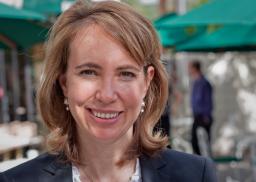- Slug: BC-CNS-Campaign Outlook,510
- With: BC-CNS-Campaign Outlook-Box
- Photo available (thumbnail, caption below)
By EVAN WYLOGE
Cronkite News Service
PHOENIX (Tuesday, Nov. 10) _ Roughly 20 supporters shared pastries, coffee and handshakes Tuesday morning while U.S. Rep. Gabrielle Giffords, D-Ariz., touted progress on environmental legislation, health care reform and economic recovery at a fundraiser in north Phoenix.
“With an election every two years, I’m always in campaign mode,” the second-term representative from southern Arizona said. “This election will be about strong ideas and a clear vision.”
With GOP leaders touting off-year victories in the New Jersey and Virginia gubernatorial races as signs of momentum nationally, party leaders at the state level are looking to make up ground they lost in 2006 and 2008, when Democrats pulled even and then ahead in Arizona’s U.S. House of Representatives delegation.
“Giffords is on our targeted list,” said Matt Roberts, communications director for the Arizona Republican Party. “Republicans are making inroads, and we plan to bring quality candidates next year.”
Roberts pointed, among other things, to Republicans picking up a city council seat in Tucson, where Democrats dominate.
“I think the Democrats hit their high water mark last year,” he said.
However, Fred Solop, political science department chair at Northern Arizona University, said the New Jersey and Virginia races shouldn’t be used to declare a national swing. And while the out-of-power party usually gains nationally in midterm elections, he said he sees only a slim chance of the GOP ousting a Democratic incumbent in Arizona.
“If it’s a small gain _ 10 to 12 seats _ it probably won’t be in Arizona,” he said.
Bruce Merrill, a retired Arizona State University professor who directs the Cronkite/Eight Poll, said GOP frontrunners looking to knock Democrats from U.S. House seats will have to speak to issues that appeal to Arizona’s large percentage of voters _ more than one in four _ who have no party affiliation.
“The economy and jobs are going to be the main issue,” he said.
Giffords said she agrees the economy will be a major factor between now and election day, but she said she trusts that voters understand the severity of the situation the Democratic majorities in Congress are dealing with. She noted that much more money from the economic stimulus will be spent by election day.
“This economic crisis didn’t happen overnight, and the recovery won’t either,” she said.
Arizona Democratic Party spokeswoman Jennifer Johnson said that despite Republicans holding an edge in registered voters the state has always had a strong independent streak. She cited the election and re-election of Gov. Janet Napolitano and Attorney General Terry Goddard, both Democrats.
“They’ve always shown willingness to elect Democrats to the highest office,” she said.
First-term U.S. Rep. Ann Kirkpatrick, a Democrat representing Arizona’s sprawling First Congressional District, is expected to receive the strongest challenge from the GOP.
But Barbara Norrander, professor of political science at the University of Arizona, said she thinks the 2010 election will unfold like most others: those in Congress tend to stay there.
“A challenger has to have a very well-structured campaign and be very well financed to unseat an incumbent,” Norrander said. “Incumbency is the best predictor for any race.”
^___=
PHOTOS: Click thumbnails to see full-resolution images.

U.S. Rep. Gabrielle Giffords, D-Ariz., held a fundraiser in Phoenix Tuesday, Nov. 10, to kick off her 2010 re-election campaign. GOP leaders say wins in other states’ off-year elections bode well for 2010 in Arizona, but political experts say Giffords and other Democratic incumbents, along with GOP incumbents, have the advantage in congressional races. (Cronkite News Service Photo by Evan Wyloge)